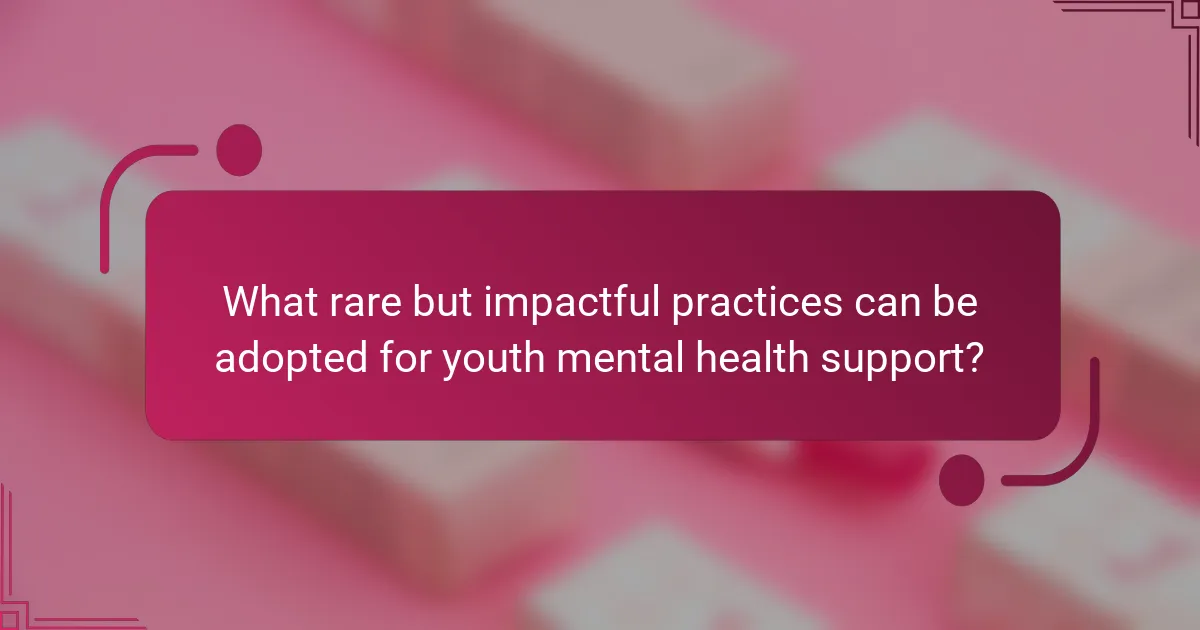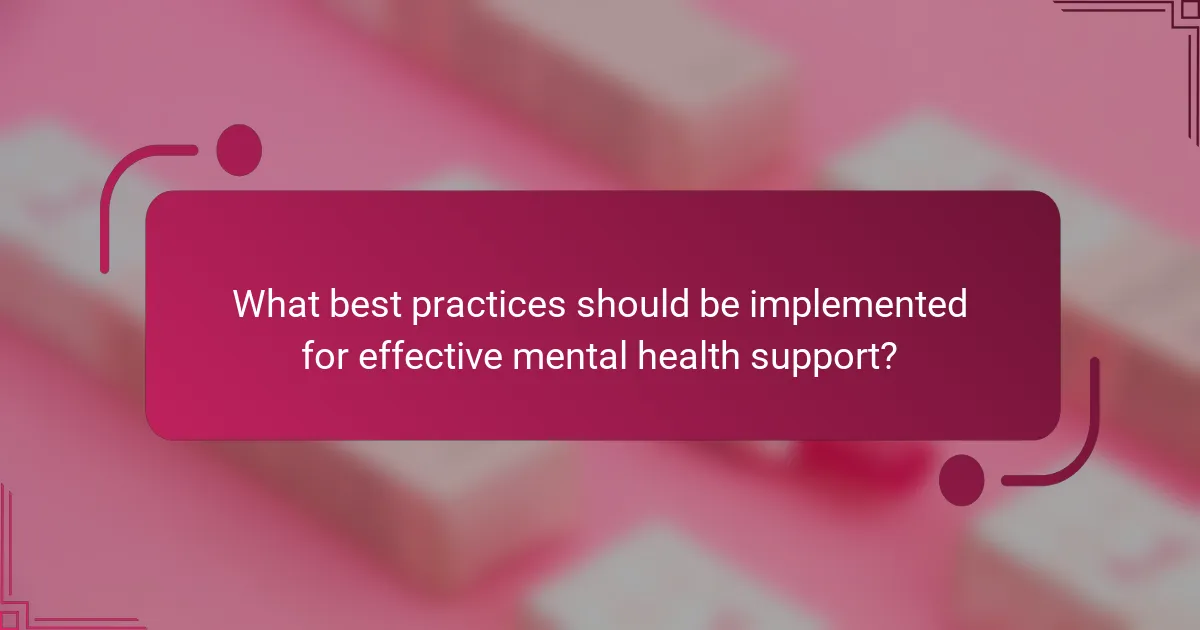Young athletes face unique challenges that require effective mental health support to build resilience and confidence. Key truths include fostering open communication, providing access to mental health resources, and creating supportive environments. Innovative approaches, such as integrating sports psychology and mindfulness techniques, enhance coping strategies. Involving families and promoting a culture of effort over outcome further strengthens young athletes’ mental well-being.

What are the universal truths about mental health support for young athletes?
Young athletes require comprehensive mental health support to build resilience and confidence. Key truths include the importance of open communication, access to mental health resources, and the role of supportive environments.
First, fostering open communication allows young athletes to express their feelings and challenges. This can lead to early identification of mental health issues. Second, providing access to mental health resources, such as counselling and workshops, is crucial. These resources equip athletes with coping strategies and tools to manage stress.
Additionally, a supportive environment, including coaches and family, enhances athletes’ confidence. Positive reinforcement and understanding from mentors can significantly impact mental well-being.
Lastly, integrating mental health education into training programmes promotes awareness and normalises seeking help. This proactive approach ensures young athletes are better prepared to handle pressures associated with their sports.
Why is mental health support crucial for young athletes?
Mental health support is crucial for young athletes as it fosters resilience and builds confidence. Effective mental health strategies enhance performance, reduce anxiety, and promote a healthy balance between sports and life. Research shows that athletes with strong mental health support systems are more likely to cope with pressure and setbacks, leading to improved overall well-being. Furthermore, early intervention can prevent long-term psychological issues, ensuring that young athletes thrive both on and off the field.
What common mental health challenges do young athletes face?
Young athletes commonly face mental health challenges such as anxiety, depression, burnout, and pressure to perform. These issues can stem from high expectations, intense competition, and balancing sports with academics. Building resilience and confidence is essential for their overall well-being. Research indicates that approximately 30% of young athletes experience significant mental health challenges. Support systems, including coaches and parents, play a crucial role in addressing these issues. Encouraging open communication and providing mental health resources can help mitigate the impact of these challenges.
How do competitive pressures impact mental well-being?
Competitive pressures can negatively affect mental well-being by increasing stress and anxiety levels. Young athletes often face high expectations, which may lead to burnout or decreased self-esteem. Studies show that supportive environments can mitigate these effects, fostering resilience and confidence. Regular mental health support is crucial for managing competitive stress and promoting overall well-being in young athletes.
What role do parental expectations play?
Parental expectations significantly influence young athletes’ mental health, shaping their resilience and confidence. High expectations can motivate, but excessive pressure may lead to anxiety and burnout. Balancing support with realistic goals fosters a healthier mindset. Parents should emphasize effort and personal growth, creating an environment where athletes feel valued beyond performance metrics. This approach nurtures a positive relationship with sports, enhancing overall well-being.
How can mental health support foster resilience in young athletes?
Mental health support fosters resilience in young athletes by providing emotional tools and coping strategies. This support enhances their ability to manage stress and adversity. Research indicates that athletes with mental health resources demonstrate improved performance and confidence. Programmes focusing on mental well-being lead to a 30% increase in resilience scores among youth athletes. Additionally, regular mental health check-ins help identify issues early, promoting long-term emotional stability and success in sports.
What strategies build emotional resilience?
Building emotional resilience involves strategies such as developing a growth mindset, fostering supportive relationships, and practicing mindfulness. These approaches enhance coping skills and boost confidence in young athletes.
1. Cultivate a growth mindset: Encourage young athletes to view challenges as opportunities for growth, enhancing their resilience.
2. Build supportive relationships: Surround athletes with mentors, coaches, and peers who provide encouragement and constructive feedback.
3. Practice mindfulness: Teach techniques such as meditation and deep breathing to help manage stress and improve focus.
4. Set realistic goals: Help athletes establish achievable objectives to foster a sense of accomplishment and confidence.
5. Emphasize self-care: Promote physical health through proper nutrition, sleep, and exercise, which are crucial for mental well-being.
6. Encourage reflection: Guide athletes to reflect on their experiences, identifying lessons learned and areas for improvement.
How does resilience correlate with athletic performance?
Resilience significantly enhances athletic performance by fostering mental toughness and adaptability. Athletes with high resilience can better manage stress, recover from setbacks, and maintain focus during competition. Studies show that resilient athletes often exhibit improved confidence and motivation, which directly influences their performance outcomes. Building resilience through mental health support contributes to long-term success in sports and personal development.

What unique approaches enhance mental health support for young athletes?
Innovative approaches enhance mental health support for young athletes by fostering resilience and confidence. Programmes emphasizing emotional intelligence, peer mentorship, and mindfulness practices are particularly effective.
For example, integrating sports psychology into training routines helps athletes manage stress and build coping strategies. Additionally, creating safe spaces for open discussions about mental health reduces stigma and encourages help-seeking behaviours.
Furthermore, incorporating family involvement in support systems strengthens the athlete’s network, promoting a holistic approach to mental well-being. Lastly, utilising technology, such as mental health apps, provides accessible resources for ongoing support.
What role do sports psychologists play in athlete mental health?
Sports psychologists play a crucial role in enhancing athlete mental health by fostering resilience and confidence. They provide tailored strategies to manage stress, anxiety, and performance pressure. By focusing on mental skills training, they help athletes develop coping mechanisms and improve focus. Research indicates that athletes who engage with sports psychologists show better performance outcomes and enhanced emotional well-being. This support is vital for young athletes navigating competitive environments, as it equips them with tools for both sport and life challenges.
How can coaches effectively support mental health?
Coaches can effectively support mental health by fostering an environment that emphasizes resilience and confidence. They should prioritise open communication, allowing athletes to express their feelings and concerns.
Implementing mental health education is crucial. Coaches can introduce workshops that teach young athletes coping strategies and stress management techniques. This proactive approach builds emotional strength.
Regular check-ins with athletes help identify potential mental health challenges early. Coaches should encourage a team culture that normalises seeking help when needed, reinforcing that mental well-being is as important as physical health.
Finally, recognising individual differences is essential. Coaches must tailor their support strategies to meet the unique needs of each athlete, ensuring that all feel valued and understood.
What training should coaches undergo?
Coaches should undergo training focused on mental health support for young athletes, emphasizing resilience and confidence-building. This training should include understanding mental health issues, effective communication strategies, and techniques for fostering a positive environment.
Additionally, coaches should be trained in recognising signs of stress and anxiety in athletes, allowing them to provide appropriate support. Engaging in workshops that cover psychological first aid can enhance their ability to assist young athletes effectively.
Incorporating role-playing scenarios can also be beneficial, helping coaches practice responses to various mental health situations. Continuous education on the latest research in sports psychology will ensure coaches remain informed and effective in their roles.
How can coaches create a supportive environment?
Coaches can create a supportive environment by fostering open communication and trust. Encouraging athletes to express their feelings enhances mental health and builds resilience. Establishing team rituals promotes unity and belonging. Providing constructive feedback boosts confidence, while recognising individual achievements reinforces self-worth. Regular mental health check-ins ensure athletes feel valued and supported.
What innovative programmes exist for mental health support in sports?
Innovative programmes for mental health support in sports include initiatives that focus on resilience and confidence building for young athletes. Programmes like Athlete Assistance Programmes and mental health workshops provide tailored resources. Studies show that integrating mental health training into sports curricula enhances performance and emotional well-being. Additionally, peer support groups foster a sense of community, helping athletes navigate challenges together. These approaches emphasize the importance of mental health as a core component of athletic development.
What are the key features of successful mental health initiatives?
Successful mental health initiatives for young athletes focus on accessibility, education, community support, and ongoing evaluation. These features build resilience and confidence, ensuring athletes receive the necessary tools for mental well-being.
Accessibility ensures that resources are available to all athletes, regardless of background. Education empowers young athletes with knowledge about mental health, promoting awareness and reducing stigma. Community support fosters a safe environment where athletes can share experiences and seek help. Ongoing evaluation allows initiatives to adapt and improve based on feedback and outcomes, enhancing their effectiveness.

What rare but impactful practices can be adopted for youth mental health support?
Adopting rare but impactful practices for youth mental health support can significantly enhance resilience and confidence among young athletes. One effective practice is integrating mindfulness techniques into training routines, which has been shown to reduce anxiety and improve focus. Additionally, fostering peer support groups encourages open discussions about mental health, creating a safe space for athletes to share experiences.
Another unique approach is incorporating creative expression, such as art or music therapy, which allows youth to process emotions in a non-verbal way. Finally, implementing regular mental health check-ins can help identify issues early, promoting proactive support. These practices collectively contribute to a more holistic approach to mental health in young athletes.
How can mindfulness practices benefit young athletes?
Mindfulness practices can significantly enhance resilience and confidence in young athletes. They improve focus, reduce anxiety, and foster a positive mindset. Regular mindfulness can lead to better emotional regulation, enabling athletes to handle pressure effectively. Studies show that athletes who engage in mindfulness experience increased performance and satisfaction in their sport.
What role do peer support groups play in mental health?
Peer support groups significantly enhance mental health for young athletes by fostering resilience and confidence. These groups provide a safe space for sharing experiences and challenges, promoting emotional well-being. Participants often report increased feelings of belonging, which can reduce feelings of isolation. Research indicates that peer support can lead to improved coping strategies and better overall mental health outcomes. By connecting with others facing similar challenges, young athletes build a support network that reinforces their mental fortitude and self-esteem.
How can technology enhance mental health resources for athletes?
Technology can significantly enhance mental health resources for athletes by providing accessible support and tailored interventions. Digital platforms facilitate real-time communication with mental health professionals, allowing athletes to seek help whenever needed. Wearable devices can monitor stress levels and emotional states, offering insights into mental well-being. Virtual reality therapy can simulate challenging scenarios, helping athletes build resilience and confidence in a controlled environment. Mobile applications provide resources for mindfulness, relaxation techniques, and self-assessment tools, ensuring athletes can manage their mental health proactively. These advancements create a supportive ecosystem that prioritises mental wellness in sports.

What best practices should be implemented for effective mental health support?
Implementing best practices for mental health support in young athletes enhances resilience and confidence. Establish a supportive environment that encourages open communication about mental health.
Encourage regular mental health check-ins to assess emotional well-being. Provide access to mental health resources, such as counselling services and workshops on coping strategies.
Promote a balanced approach to training that includes rest and recovery, reducing the risk of burnout. Involve parents and coaches in mental health education to create a holistic support system.
Foster a culture that values effort over outcome, helping athletes develop a growth mindset. Celebrate achievements, both big and small, to build confidence and resilience.
How can parents contribute to their child’s mental well-being in sports?
Parents can significantly enhance their child’s mental well-being in sports by fostering a supportive environment. Encouragement and positive reinforcement build resilience and confidence, essential traits for young athletes. Engaging in open communication allows children to express their feelings about competition and performance, reducing anxiety. Additionally, promoting a balanced perspective on success and failure helps children develop a healthy mindset towards challenges. Lastly, participating in their child’s sporting activities demonstrates commitment and interest, strengthening the parent-child bond and enhancing emotional support.
What common mistakes should be avoided in mental health support for athletes?
Common mistakes in mental health support for athletes include overlooking individual needs, emphasizing performance over well-being, and failing to foster open communication. These errors can undermine resilience and confidence. Providing tailored support, prioritising mental health, and encouraging dialogue are essential for effective assistance.
What actionable tips can improve mental health practices in youth sports?
To improve mental health practices in youth sports, focus on fostering open communication and emotional support. Encourage athletes to express feelings and concerns. Implement regular mental health workshops to build resilience and confidence. Promote a positive team culture that values mental well-being alongside physical performance. Engage parents and coaches in mental health education to create a supportive environment.